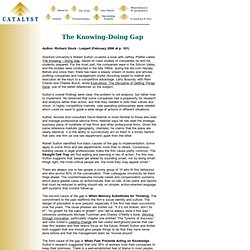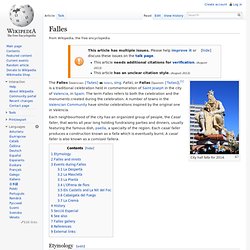

How do people use free Internet materials to learn something new? OER4Adults. The Knowing-Doing Gap. Stanford University’s Robert Sutton co-wrote a book with Jeffrey Pfeffer called The Knowing – Doing Gap, based on case studies of companies he and his students prepared.

For the most part, the companies were in the Silicon Valley and the studies were conducted in the late 1990s, during the dot-com heyday. Before and since then, there has been a steady stream of books and articles profiling companies and management styles favouring speed to market and execution as the keys to a competitive advantage. Larry Bossidy, with Ram Charan and Charles Burck, wrote Executions: The Discipline of Getting Things Done, one of the better references on the subject.
Sutton’s overall findings were clear: the problem is not analysis, but rather how to implement. He observed that some companies had a propensity for research and analysis rather than action, and that they needed to redo their values and vision. Robert Sutton identified five basic causes of the gap to implementation. New Help for Closing the Knowing-Doing Gap. By admin 04/21/2010 11:49 AM EST | 4 Comments Professor Robert Kegan‘s recent book, Immunity to Change: How to Unlock the Potential in Yourself and Your Organization, written with Lisa Lahey, provides insight into how an individual’s long-held beliefs and habits can keep him or her from positive change.

In the book — and in this Q&A — Kegan and Lahey explain how this immunity builds up, and suggest how people can put an end to the patterns that prevent real change. What is the “knowing-doing gap”? Lahey: Ever tried to make a change you want to make, but you still can’t do it? That’s a version of the knowing-doing gap. So the gap must not be about motivation. Kegan: Well, it is hard to change if you are not motivated; but, yes, motivation alone is often not enough.
But Immunity to Change is an optimistic book. L: We have been working on how to close this gap for 20 years and I think we are getting somewhere. But it doesn’t work. K: Actually, it works pretty well for awhile. Such as? Pomodoro! Best online pomodoro timers. I grabbed a cup of tea, set my timer for 3 Pomodori and got in front of my laptop to review online pomodoro timers.

After a quick search, and much to my surprise, I was able to find all of 4 (four) online timers to test and review! Given the fact that a “pomodoro timer” search returns over 50 results on iPhone app store, such lack of options was surprising to me. I am sure that there are some other online pomodoro timers out there but for the time being, I will go ahead with the few that I could find and grow this list over time.
So, here we go: 1. I’ve been using Focus Booster for the past 3 years. 2. This is one of the more interesting online implementations of the Pomodoro Technique. 3. Tomato Timer, visually, is a bit cluttered but offers some good features. 4. A simple pomodoro timer that launches immediately – you have no control such as start/pause or stop. eChallenges 2013. eChallenges e-2013 Conference (09 - 11 October) was the twenty-third in a series of annual technology research conferences supported by the European Commission and hosted by national governments.
Plenary Speakers & Panelists Plenary Speakers and Panelists included - Ms Eunkyung Kim, Deputy Director, Ministry of Science, ICT and Future Planning, Korea - Tom Clausen, Programme Coordination, DG CONNECT, European Commission - Dr Imelda Lambkin, National NCP Director, Enterprise Ireland - Stephen O'Reilly, National Delegate & Contact Point for FP7-ICT, Enterprise Ireland.
Falles. City hall falla for 2014.

The Falles (Valencian: [ˈfaʎes] ( ), sing. Falla), or Fallas (Spanish: [ˈfaʎas]),[1] is a traditional celebration held in commemoration of Saint Joseph in the city of Valencia, in Spain. The term Falles refers to both the celebration and the monuments created during the celebration. A number of towns in the Valencian Community have similar celebrations inspired by the original one in Valencia. Each neighbourhood of the city has an organized group of people, the Casal faller, that works all year long holding fundraising parties and dinners, usually featuring the famous dish, paella, a specialty of the region. Etymology[edit] The name of the festival is the plural of the Valencian word falla.
Latin fax "torch" → Latin facvla (diminutive) → Vulgar Latin *facla → Valencian falla. Falles and ninots[edit] Formerly, much time would be spent by the Casal faller preparing the ninots (Valencian for puppets or dolls). Events during Falles[edit] La Despertà[edit] La Plantà[edit] Centro de Formación Permanente.